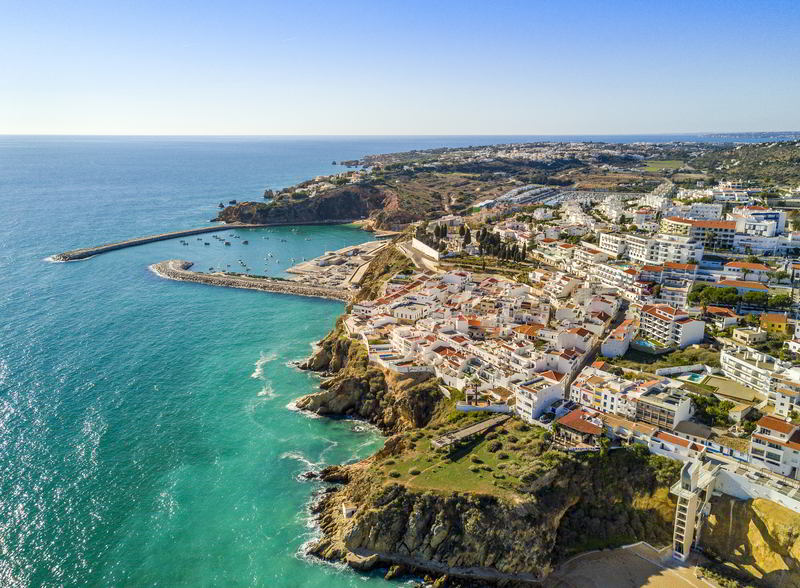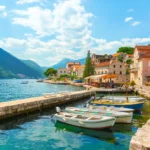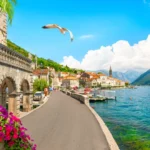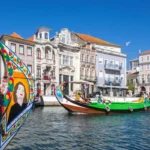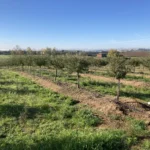Once A World Player, Now A Little-Known Safe Haven
Picture a chain of historic and charming small towns strung together by a single-lane highway, people walking or biking along, passing roadside stands offering fresh fruit at unbeatable prices (3 euros for a 5-pound bag of oranges!).
The weather is warm, and blossoming vines grow over the stucco walls that hide beautiful villas inside. Thanks to fantastic weather year-round, with more than 300 sunny days a year, every day is a perfect day to get out and enjoy your new home (and you won’t need to worry about heating or air conditioning bills).
Continue east, and small towns give way to flowering hedges, tall trees, and grasslands. The landscape is an eye-candy explosion of orchards and flowers that bloom year-round, across more than 200 kilometers of craggy coastline and some of Europe’s best beaches…
This is Portugal’s Algarve… and as alluring as its current assets are, I’m a history nerd and a sucker for good stories, of which this region has many. Allow me to share a few of my favorites…
The Beginnings Of Portugal
Thanks to their long reign, you’ll notice a strong Moorish influence throughout the region. In fact, they named the place. Algarve derives from the Arabic “Al-Gharb,” meaning “The West”… though in fact the Algarve’s long coast faces mostly south. Many of the region’s churches— including some in Loulé, Faro, and Tavira—were originally mosques. As well as leaving an architectural legacy, the Moors also left a wealth of exotic crops, introducing the fig, carob, almond, and orange trees that punctuate the landscape throughout southern Portugal and influence its cooking.
The Romans were in this part of the country, too, and credited with planting the olive trees the area is known for, along with the local production of salt. The bridge of Tavira dates to the Romans, and the introduction of Latin was the base for the Portuguese language.
Indeed, Portugal is one of the oldest countries in Europe, its name first appearing in print in 868 and with the same defined borders since 1249. Lisbon is the second-oldest European capital (after Athens), a full four centuries older than Rome itself. Settled by the Phoenicians around 1200 B.C., they recognized the excellent transport possibilities offered by the River Tagus.
Portugal was arguably the first Catholic country in Europe, but many of the region’s churches, with their intricate gilded wood designs in the Baroque style, came later, during the colonization of Brazil in the 18th century.
Portugal’s is one of the oldest continuously serving navies in history, its origins dating to the 12th century. The alliance between England and Portugal, originally signed in 1373, is the oldest in the world still in force. Both countries have entered wars to defend the other.
Portugal did something else for England—it introduced the habit of drinking tea. The world owes its love of tea not to Britain but to the Portuguese Catherine of Braganza, who married King Charles II of England and brought her tea customs with her to the British court.
Portugal In The Spotlight
In recent history, Portugal has been mostly ignored and overlooked, but there was a time when this country had the world’s attention. It was the Portuguese Prince Henry the Navigator, an architect of the Age of Exploration, who bid his men to “sail on, sail on.” Those orders compelled brave adventurers around the Cape of Good Hope to China and India and then across the Atlantic.
A major power in Europe at the time, Henry the Navigator sailed from the Algarve to discover the Portuguese islands east and south and to conquer the African coast and Morocco. Later, Vasco da Gama, among others, discovered the routes to India and Brazil, resulting in the largest trading empire in the world.
Towns like Tavira became important trading ports. Later, during almost 30 years of war with Spain, fortresses were built along the borders and the coastline to protect the cities, and many of these remain today.
Half of the New World belonged to Portugal. In 1494, the Treaty of Tordesillas gifted the country with Brazil, Africa, and Asia, making the Portuguese Empire the first global empire in history. Its colonial period was one of the longest lived, lasting for almost six centuries from the taking of Ceuta in Africa in 1415 until Macau was handed over to the Chinese in 1999.
In 1755, after an earthquake and the tsunami that followed, many Algarve cities were destroyed. Faro survived and became the region’s capital.
Portugal Today
In 1974, 50 years of dictatorship ended and Portugal became democratic. The Algarve soon became known for its tile work, lace, cork, and agriculture.
Somehow this great and grand country with such a long and illustrious history fell off the world stage, and more recently, Portugal was one of the hardest hit EU countries in the post-2008 crisis period…
But if Portugal is anything, she is flexible, creative, and, ultimately, a survivor. Whatever trouble you put in her path, she manages to overcome it—often by thinking outside the box, pursuing some contrarian strategy that has pundits shaking their heads in disbelief.
Take her drug crisis of the 1990s as an example. The country was falling into a heroin hole. It was possibly the worst drug epidemic the world has ever seen—people would shoot up in broad daylight, on the street in plain sight. An entire part of the city—a very visible part—had been given over as a user den and drug market. A full 1% of the population was addicted and the country had the highest rate of HIV in Europe.
Portugal’s solution? No limitations, no licensing… just plain and simple legalization of all drugs, period, imposed practically overnight.
Today, nearly 20 years later, drugs are barely a concern—transplanted by the economic crisis that rocked the world just over a decade ago…
But unlike Greece, Italy, Ireland, and other EU nations in crisis, Portugal again chose policies that flew in the face of accepted political strategies. The government resisted the EU-imposed austerity measures, rolling them back as quickly as they feasibly could. Posting positive GDP growth in 2014, the country quickly did an about-face, creating a business-friendly environment that incentivizes rather than discourages.
While the government is still conservative in investment, where they are spending their money has successfully ignited the economy. Its focused initiatives invite foreigners and foreign companies to come and spend, including significant tax breaks for both the individual, the investor, and the businessman.
The country is now reaping the benefits, with 2018 posting the highest GDP per capita in a decade. By limiting public spending, the current administration has managed to decrease the budget deficit to just 0.5% of GDP (one of the smallest budget arrears in the euro zone), lowering it more than expected for 2018 and putting it close to balancing its books. The country hopes to manage a surplus in 2020—a year sooner than projected, and ending a quarter-century of deficit.
Aside from the visual confirmation of the renewal—new businesses, more tourists, more exports, and low unemployment numbers—it’s the feeling of invigoration that’s so palpable here throughout the country…
And next April is your opportunity to come and see it all for yourself… and get the inside scoop from our team of Portugal experts and expats…
If you’re ready to pay Portugal a visit—and get a crash course in everything you need to know to make a move in this undervalued Old World haven—then join us on the ground April 15–17 where you’ll:
- Explore with us to see the best of what Portugal has to offer. Listen to experts and expats as they share their knowledge and insight—and showcase their country’s assets…
- Discover the natural beauty of the Algarve. At this Live and Invest in Portugal Conference, we’ll not only show you the natural wonders of the Algarve from our conference room… but can organize a personal tour to show you the best of what the region has to offer…
- Get the facts on being a part- or full-time resident in the Algarve and beyond, straight from expats who live there now…
- Discover the large selection of affordable rentals—starting at US$650 per month—and where you should be looking…
- Find out how safe and secure it is in this little-known corner of Europe…
- Have a look at Portugal’s medical care… how modern, accessible, and affordable it is… and why the Algarve has become a medical tourism hub…
- Consider the possibilities for learning Portuguese… as a terrific investment to help you get the most out of your life here…
- Get a sense of the cost of living… we’ll share with you actual expats’ budgets and the lifestyles those budgets support…
Our business experts will be in Carvoeiro, too, to walk you through the practicalities of starting a business in the Algarve… dealing with taxes… and we’ll explore current opportunities for investment…
And, of course, we’ll get to grips with the local property market… establishing residency… navigating the banking system… and more…
To get in at the Early Bird price… and secure yourself a complimentary VIP Package with us in Portugal… be sure to reserve your seat without delay…

